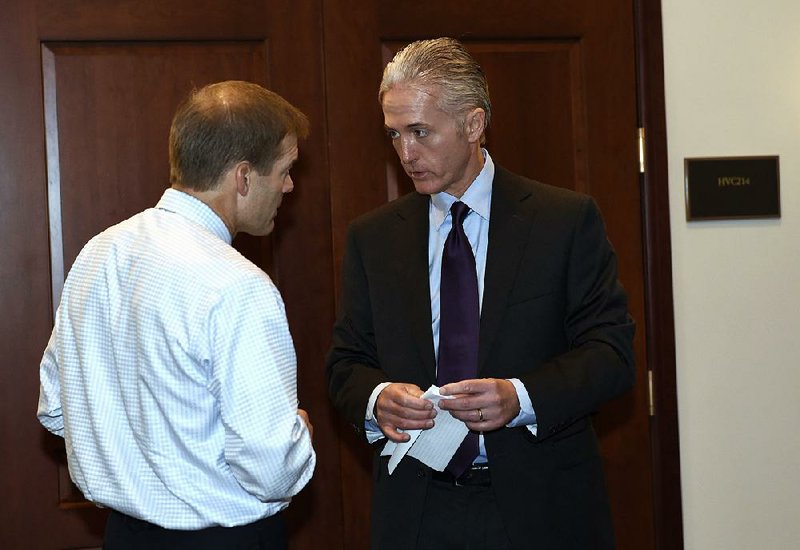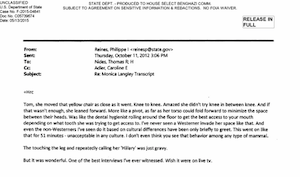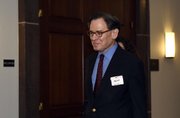WASHINGTON -- The Republican chairman of a House panel investigating the deadly attacks in Benghazi, Libya, complained Tuesday about delays in receiving emails between Democratic presidential candidate Hillary Rodham Clinton and a longtime confidant.
The confidant, Sidney Blumenthal, testified Tuesday for several hours in a private session before the panel.
Committee Democrats countered that the delays were understandable after the committee expanded its scope from a probe of the September 2012 attacks that killed four Americans, including the U.S. ambassador, to a broader examination of U.S. policy toward Libya.
"I will leave it to you to figure out whether there was a failure to produce on the former secretary's part or a failure to produce on the Department of State's behalf," Rep. Trey Gowdy, R-S.C., told reporters Tuesday. "But clearly the committee should have gotten this information sooner."
Democrats said Gowdy, the chairman of the Benghazi panel, has begun seeking emails and other documents that go far beyond Benghazi or the terrorist attacks. They cited a May 29 letter Gowdy sent to Blumenthal that seeks "any and all documents and communications" sent to or received by Blumenthal related to Libya, "but not limited to Benghazi and Tripoli."
Rep. Adam Schiff, D-Calif., said Gowdy and other Republicans were continuing to "move the goal posts in terms of what they're asking for from the State Department."
Schiff, a member of the Benghazi committee, said the shift in tactics was occurring "out of frustration [by Republicans] that they weren't able to find anything of any interest on Benghazi -- that is, anything that hadn't already been disclosed by the eight other investigations" conducted over the past several years.
Blumenthal on Tuesday was pressed for answers about frequent emails on Libya that he sent Clinton when she served as secretary of state. Blumenthal worked in the White House under President Bill Clinton and is a longtime friend and adviser to the Clinton family.
Gowdy said Tuesday night that Blumenthal did not write any of the memos he forwarded to Clinton.
Rather than offer original analysis, Blumenthal was "simply and merely a conduit of someone who may have had business interests in Libya," Gowdy said after Blumenthal testified.
Both Gowdy and Blumenthal agreed that Blumenthal shed little light on the Benghazi attack, but Gowdy called the session "productive" and informative. Blumenthal, however, said his appearance "was for one reason and one reason only, and that reason is politics."
Blumenthal, meeting with reporters after he testified, said the memos were written by a former high-ranking CIA official, adding that he passed them on to Clinton as a friend.
Blumenthal and Gowdy declined to name the author of the memos, but emails released last month show at least one memo written by former CIA official Tyler Drumheller.
Blumenthal said he "explained the facts" about his correspondence with Clinton and "dispelled some myths recklessly disseminated" by committee members.
"I answered every question," Blumenthal said, adding that he "shed no light on events in Benghazi" because he has no firsthand knowledge and never worked for President Barack Obama's administration.
The committee announced Monday night that it had received about 60 new emails totaling 120 pages from Blumenthal. The emails are between Clinton and Blumenthal and were not previously produced to the committee or released to the public, a committee spokesman said.
Blumenthal's discussions with Clinton emerged when nearly 350 pages of emails about the 2012 attacks on the U.S. diplomatic post in Benghazi were publicly released last month.
Blumenthal offered advice and intelligence to Clinton, sending frequent emails about the growing unrest in Libya to the personal email account Clinton continued to use as a government employee. Clinton often forwarded the messages to aides.
Rep. Elijah Cummings, D-Md., the senior Democrat on the panel, said Blumenthal's deposition was the latest example of how the committee "has strayed far from investigating the Benghazi attacks and is now focused like a laser on attacking Secretary Clinton in her run for president."
Republicans no longer appear interested in discovering facts about Benghazi and are instead trying to prove that Clinton "engaged in some sort of conspiracy" over the attacks, Cummings said, calling the investigation a "travesty" that has cost taxpayers more than $3.5 million.
A Section on 06/17/2015



